Mentor Commentary Series | MOT/MNT (17 vols.)
Digital Logos Edition
Overview
The Mentor Commentary Series (17 vols.) combines a high view of Scripture with access to the latest academic theological research. This unique combination allows the reader to see what recent scholarly research has discovered without losing sight of the inerrancy of Scripture. Uncover the meaning of Scripture, and clarify its relevance for your life today. Grasp the significance of the Bible for our times. And discover the richness of Scripture with detailed commentary, thorough exegesis, and probing questions on literary, interpretive, and contextual issues.
These important commentaries are essential for pastors to use for sermon preparation, and for students and scholars of the Bible interested in literary, exegetical, and interpretive questions. Although they discuss textual, linguistic, and grammatical issues, they do so using English, making them accessible for English-only study. Detailed footnotes, a bibliography, and subject and author indexes make each volume a useful starting point for further research on a particular book of the Bible.
This collection is no longer available. For the most up-to-date collection, check out Mentor Commentary Series | MOT/MNT (21 vols.).
- Discussion of important textual, literary, and philological questions
- Introduction to the style, structure, and composition, including authorship
- Background studies on the literary traditions
- Exegetical and interpretive issues are discussed
- Survey of the historical and cultural setting of the book
- Title: Mentor Commentary Series (17 vols.)
- Series: Mentor Commentary
- Publisher: Mentor
- Volumes: 17
- Pages: 8,744
Individual Titles
- Exodus by John L. McKay
- Leviticus by Robert I. Vasholz
- 1 & 2 Chronicles by Richard Pratt
- Ezra & Nehemiah by Tiberius Rata
- Psalms, vol. 1 by Allan Harman
- Psalms, vol. 2 by Allan Harman
- Proverbs by John A. Kitchen
- Jeremiah, Vol. 1 by John L. MacKay
- Jeremiah, Vol. 2 by John L. MacKay
- Lamentations by John L. MacKay
- Hosea by John L. Mackay
- Joel & Obadiah by Irvin Busenitz
- Amos by Gary Smith
- Matthew, vol. 1 by Knox Chamblin
- Matthew, vol. 2 by Knox Chamblin
- Galatians by David McWilliams
- Philippians by Matthew S. Harmon
This title is included in the following collections
You can save when you purchase this product as part of a collection.
Logos 8 Reformed Bronze Legacy...
$89.99$62.99Logos 8 Reformed Silver Legacy...
$349.99$244.99Mentor Commentary Series (23 v...
$624.81$499.99Logos 8 Reformed Gold Legacy L...
$849.99$594.99
- $849.99$594.99
- $849.99$594.99
- $849.99$594.99
- $1,499.99$1,049.99
- $1,499.99$1,049.99
- $2,999.99$2,099.99
- $2,999.99$2,099.99
- $2,999.99$2,099.99
- $2,999.99$2,099.99
- $4,749.99$3,324.99
- $4,749.99$3,324.99
- $4,749.99$3,324.99
- $4,749.99$3,324.99
- $4,749.99$3,324.99
- $21,749.99$15,224.99
- $24,999.99$17,499.99
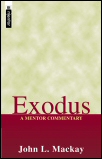
Exodus
- Author: John L. McKay
- Publisher: Mentor
- Publication Date: 2001
- Pages: 624
The book of Exodus is about a journey: a journey out of Egypt, but more particularly a journey from a land where God’s power, sovereignty and continuing interest in his people could be easily questioned, to a place where God dwelt in the midst of his people. Exodus describes God’s power, his redemption of his people, his covenant requirements at Sinai, and the rules of his worship.
In this volume, John L. Mackay interacts with other scholars in either text or footnotes. In addition to exploring the meaning of the text he examines the chronology, authorship, composition and structure of Exodus. In addition, at the end of each section he provides a reflective comment.
Professor Mackay has produced a strong commentary on the Book of Exodus. It is filled with excellent material for the pastor and the serious-minded Bible student. I especially appreciate the work on application that is normally so difficult to draw out of historical literature. I recommend this work highly. It is a valuable tool for the study of this most important period in Israel’s history.
—John Currid, Carl McMurray Professor of Old Testament, Reformed Theological Seminary, Charlotte, North Carolina
A tour de force of conservative evangelical exposition. Massively researched, painstakingly explained, theologically nuanced, reliably expounded, simply expressed, and sensitively applied. This volume will be of considerable value to all preachers and Bible students. For accessible and scholarly comment, Mackay’s work should quickly become the standard evangelical work on the Book of Exodus.
—Stephen Dray, Minister, Ferndale Baptist Church, Southend-on-Sea, England
John L. Mackay is internationally known as an Old Testament scholar and is also in demand for church retreats where his skill in the practical exposition and application of doctrine are well respected. He is also the author of Haggai, Zechariah, & Malachi and Jonah, Micah, Nahum, Habakkuk, & Zephaniah in the Focus on the Bible Commentary.
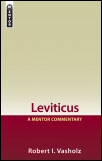
Leviticus
- Author: Robert I. Vasholz
- Publisher: Mentor
- Publication Date: 2007
- Pages: 380
Leviticus received its English title from the Greek Levitikon, which means “pertaining to Levites.” Jewish scribes, who called Leviticus the Priest’s Manual, probably influenced the title in the Talmudic Period (200 B.C.–200 A.D.). While the title is appropriate for certain sections of Leviticus, it fails to point out that most of the book is directed to all the people of Israel. The priesthood of Israel was not meant to be a secret society with mysterious practices known only to them.
Sadly, it appears the book of Leviticus has been retired to a secondary status in the Church today. Christians have largely relegated the punctilious details about such things as sacrifices and purity laws to a bygone era. There, is of course, some good reason for that. While rabbinic commentary teaches that this is the first book of Scripture that children should learn (age 5), modern readers often view Leviticus as tedious and dull. Reading Leviticus was in the word of a third century church scholar, like having to eat unfit food.
The practices in Leviticus may seem distant and mysterious to the modern western world, yet there are fundamental elements in the book of Leviticus that are both universal and relevant to the contemporary scene. What Christian would say that loving your neighbor as yourself, the second greatest commandment, should be relegated to the past? Here is one the most oft-cited verses in the New Testament Scripture—a command that first appears in the book of Leviticus. But it doesn’t stop there. Hebrews particularly expounds on Leviticus; it is close to impossible to comprehend parts of Hebrews without reference to Leviticus. This can be said with regard to passages in the gospel as well.
Dr. Vasholz claims that Leviticus, far from being a book to avoid or skip over, is of basic importance to the Bible and to our understanding of what it teaches. His commentary proves the claim to the hilt. It is a high treat to enter into huge scholarship wedded to patient, detailed explanation and exposition of the sacred text. Here is Leviticus brought out of obscurity into the light, off the sidelines into the mainstream. The patience of his scholarship calls for patience in our reading, and rewards it.
—Alec Motyer, author of Isaiah in the Tyndale Commentaries
Vasholz’s commentary on Leviticus provides another helpful resource for students of the Scriptures. His work on this often-neglected biblical book will take its place next to a comparatively small group of commentaries that combine an evangelical focus, a high view of Scripture, careful attention to the text, and an avoidance of overemphasis on symbolism and typology. Throughout the volume, he interacts with other commentaries on Leviticus as well as various monographs, writes clearly in an expositional fashion, and provides helpful explanations of a book whose meaning and importance eludes many of its readers.
—Michael A Grisanti, Professor of Old Testament, The Master’s Seminary
Robert I. Vasholz is Professor Emeritus of Old Testament at Covenant Theological Seminary in St Louis, Missouri. Though Dr. Valshoz retired in 2007, he continues to serve God’s people through his teaching, preaching and publishing projects.
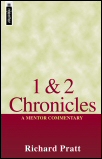
1 & 2 Chronicles
- Author: Richard Pratt
- Publisher: Mentor
- Publication Date: 2006
- Pages: 736
The books of Chronicles are among the most neglected portions of Scripture. Many find its complex history unfamiliar and assume that it is irrelevant for contemporary life. To grasp the significance of Chronicles for our times, we must first understand its original meaning. It was written to encourage the Jews to be faithful to God (and not focus on material prosperity) on their return from Babylon. Pratt looks skillfully at the big picture in each section and presents the detail in an absorbing way.
Richard Pratt’s exemplary commentary is systematic, scholarly, sober and simple. . . . Professor Pratt’s style is simple and clear . . . he sketches the complicated lineage of the high priesthood . . . so clearly that any reader can discern at a glance the lay of the land.
—Bruce Waltke, author of the commentary on Proverbs in the New International Commentary on the Old Testament (NICOT)
Richard L. Pratt is the president of Third Millennium Ministries. He is adjunct professor of Old Testament at Reformed Theological Seminary, and a visiting professor at Covenant Theological Seminary. He is an ordained minister in the Presbyterian Church in America, and travels extensively to evangelize and teach.
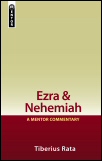
Ezra & Nehemiah
- Author: Tiberius Rata
- Publisher: Mentor
- Publication Date: 2011
- Pages: 288
Tiberius Rata, an Old Testament scholar, considers the narrative of the restoration of the Jewish people to its homeland. At the center of these two books of Ezra and Nehemiah are the decrees of two Persian kings, Cyrus and Artaxerxes. We discover a God who is in control of history and the hearts of his people. Yahweh can even work through the lives of secular kings.
This commentary on Ezra and Nehemiah is superbly written, beautifully illustrated and carefully documented. Dr. Rata has provided the student of Scripture with a thoughtful commentary on Ezra and Nehemiah that is holistic in approach. He skillfully weaves together matters of the Hebrew text, historical backgrounds, theology and archaeological discoveries. Also not forgotten are the practical needs of the contemporary Christian. This is a book suitable for the classroom, pastor’s office, or the scholar’s study.
—John J. Davis, president/professor emeritus, Grace College and Grace Theological Seminary
Tiberius Rata has provided the church with a clearly written, insightful synthesis of the often-neglected books of Ezra and Nehemiah. The author’s style is concise and readable; he stays on track and refuses to deviate from his primary goal of illuminating the meaning and significance of the biblical text. One of the most useful features of this volume is its attention to contemporary relevance. Without violating the meaning of the ancient text in its context, the author derives helpful practical insights that are consistent with its original intention.
—Robert B. Chisholm Jr., chair and professor of Old Testament studies, Dallas Theological Seminary
Tiberius Rata, a native of Romania, is the chair of the Biblical Studies Department and professor of Old Testament studies at Grace College and Theological Seminary, Winona Lake, Indiana. He is a member of the Evangelical Theological Society and the Institute for Biblical Research and has presented papers at the national conventions of the Evangelical Theological Society.
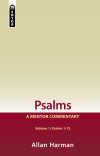
Psalms 1–72 contain the praises of the people of God. It is the people of Israel’s creed. But more than that, they reveal historical personal accounts which demonstrate how the people of God are to put their trust in him in every circumstance, and they display the character of God, who is majestic, sovereign, and compassionate.
Allan Harman’s commentary is the fruit of a lifetime’s study of the Psalter and provides a well-informed, reliable guide to the vast literature on the subject. The extensive introduction is itself worth its weight in gold while the Scripture text is opened up in a clear, careful, and devout way.
—Philip H. Eveson, former principal, London Theological Seminary
Harman’s commentary on the Psalms is a solid exposition of the Psalms. The focus is on the original meaning of the psalms with clear explanations of the message of each psalm through an analysis of structure, key words, and the flow of the psalm. And yet, the meaning of the psalms for God’s people today is also emphasized by showing important connections to the New Testament. The reader will discover the rich treasures in the Psalms through the use of this commentary.
—Richard P. Belcher Jr., professor of Old Testament, Reformed Theological Seminary
Allan Harman writes as a Christian scholar, with academic precision and devotional warmth. The unique character of this commentary is undoubtedly due to the method of its preparation . . . After completing careful exegesis of each psalm, Allan brought the fruits of his study into the service of family worship in his own home. The result is a commentary that is both academically solid and devotionally rich. This commentary will be a worthy resource for the pastor and student in the study as well as the layman seeking personal edification.
—Michael LeFebvre, pastor, Christ Church Reformed Presbyterian Church, Indianapolis, Indiana
Allan Harman has had a lifetime interest in exposition of the biblical text, and also in the history of interpretation. He is research professor of Old Testament at the Presbyterian Theological College in Melbourne, Australia. He has lectured and preached in many countries, and continues to serve as the senior editor of the Reformed Theological Review, Australia’s oldest theological journal.
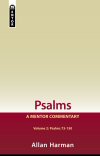
Psalms 73–150 contain the praises of the people of God. It is the people of Israel’s creed. But more than that, they reveal historical personal accounts which demonstrate how the people of God are to put their trust in him in every circumstance, and they display the character of God, who is majestic, sovereign, and compassionate.
Allan Harman’s commentary is the fruit of a lifetime’s study of the Psalter and provides a well-informed, reliable guide to the vast literature on the subject. The extensive introduction is itself worth its weight in gold while the Scripture text is opened up in a clear, careful, and devout way.
—Philip H. Eveson, former principal, London Theological Seminary
Harman’s commentary on the Psalms is a solid exposition of the Psalms. The focus is on the original meaning of the psalms with clear explanations of the message of each psalm through an analysis of structure, key words, and the flow of the psalm. And yet, the meaning of the psalms for God’s people today is also emphasized by showing important connections to the New Testament. The reader will discover the rich treasures in the Psalms through the use of this commentary.
—Richard P. Belcher Jr., professor of Old Testament, Reformed Theological Seminary
Allan Harman writes as a Christian scholar, with academic precision and devotional warmth. The unique character of this commentary is undoubtedly due to the method of its preparation . . . After completing careful exegesis of each Psalm, Allan brought the fruits of his study into the service of family worship in his own home. The result is a commentary that is both academically solid and devotionally rich. This commentary will be a worthy resource for the pastor and student in the study as well as the layman seeking personal edification.
—Michael LeFebvre, pastor, Christ Church Reformed Presbyterian Church, Indianapolis, Indiana
Allan Harman has had a lifetime interest in exposition of the biblical text, and also in the history of interpretation. He is research professor of Old Testament at the Presbyterian Theological College in Melbourne, Australia. He has lectured and preached in many countries, and continues to serve as the senior editor of the Reformed Theological Review, Australia’s oldest theological journal.
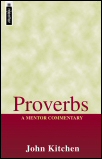
Proverbs
- Author: John A. Kitchen
- Publisher: Mentor
- Publication Date: 2006
- Pages: 792
The escalating growth of our technological knowledge in the last century has been nothing short of breathtaking—but has it rendered us wiser? Or godlier?
We have lost something priceless, and seem to be trying to replace it with more and more information. We need wisdom! Communications technology leaves us no rest to work things out: mostly we just react, and worry, and fail—and react again. We make business decisions, ethical decisions, and relationship decisions, against a continuously moving landscape that doesn’t allow them to be satisfying, consistent, or dependable.
There is no better starting point for understanding wisdom than the book of Proverbs. Its purpose is to impart wisdom to those who want it. John Kitchen has produced a work that is authoritative, comprehensive and insightful. He examines the chronology, authorship, composition, structure and context of Proverbs and does the hard work of providing cross-references alerting the reader to rich veins running beneath the surface of Proverbs and other Biblical books.
This is my favorite commentary on Proverbs.
—C. J. Mahaney, President, Sovereign Grace Ministries
Dr. John Kitchen’s commentary represents a good combination of scholarly research and practical godly admonition. It provides both the experienced biblical scholar and the beginning Bible student a very helpful resource for the study of Proverbs.
—Gennady Pshenichny, Lecturer in the Old Testament, Former President, Kuban Evangelical Christian University, Krasnodar, Russia
In this commentary on Proverbs, John Kitchen combines careful attention to the text with a warm pastoral concern for his readers. He is familiar with the scholarly discussions on the book, but he avoids technical jargon as he interprets Proverbs for the life setting of the twenty-first century. His lucid exposition expertly focuses on two questions that are too often neglected: How does the message of Proverbs connect with other biblical passages? And, how does this ancient book speak in specific terms to life today? This book will prove helpful for laypeople, students, and scholars alike.
—Daniel J. Estes, Dean of the Biblical & Theological Studies Department, Cedarville University
John Kitchen readably reflects the fruits of his precise and insightful teacher’s mind and his down-to-earth and caring pastor’s heart. Kitchen’s volume is that rare and beautiful combination: in equal—and very generous—portions, an intellectual feast for the curious mind and a spiritual feast for the needy soul!
—A. Boyd Luter, Professor of Biblical and Theological Studies at the Criswell College
Committed to the full integrity and authority of the Bible as the written Word of God, to careful exegesis of the text, and to practical application of the truths of biblical wisdom to everyday life.
—Eugene H. Merrill, author of An Historical Survey of the Old Testament
He is clear and probing on the text and always practical. His appendix on wisdom versus folly is powerful and his thematic index of Proverbs opens up the only real preaching possibility for expositors beyond chapter nine of the book. Strings of pearls cannot be taught or preached verse by verse. This is a solid and substantial piece of work, which will deservedly take its place as one of the finest contemporary treatments available.
—David L. Larsen, Professor Emeritus of Preaching, Trinity Evangelical Divinity School
John Kitchen is the Senior Pastor at the Stow Alliance Fellowship, Stow, Ohio
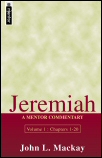
Jeremiah, Vol. 1
- Author: John L. McKay
- Publisher: Mentor
- Publication Date: 2004
- Pages: 576
Jeremiah served as a prophetic voice in a crumbling world. He spoke out against kings and rulers, and suffered for his role in proclaiming God’s truth. His complex book is filled with history, poetry, and prophecy, and in this commentary, John L. McKay helps modern readers decipher the details and apply Jeremiah to today. He examines the life of Jeremiah, the structure and theology of the books, as well as translation difficulties. He then provides nearly 500 pages of commentary on the first twenty chapters of Jeremiah.
John L. Mackay’s commentary on Jeremiah is a first class explanation of the prophet. . . . It is certain to become the first ‘port of call’ in my studies of the book. . . . He has the ability to uncover the significance of the original message in such a way as to leave the application (almost) transparent.
—Stephen Dray, Ferndale Baptist Church, Southend-on-Sea, England
The commentary is as full as is reasonably possible, verse by verse, often word by word, and covers every question likely to be raised.
— The Gospel Magazine
John L. Mackay is internationally known as an Old Testament scholar and is also in demand for church retreats where his skill in the practical exposition and application of doctrine are well respected. He is also the author of Haggai, Zechariah, & Malachi and Jonah, Micah, Nahum, Habakkuk, & Zephaniah in the Focus on the Bible Commentary.
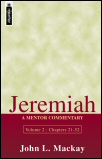
Jeremiah, Vol. 2
- Author: John L. McKay
- Publisher: Mentor
- Publication Date: 2004
- Pages: 640
This volume concludes John L. McKay’s commentary on Jeremiah. The prophecy and the narrative in this section covers judgment on the nations, false prophets, the fall of Jerusalem, and more.
Professor Mackay’s commentary on Jeremiah is trebly welcome: first, from his earlier work on Exodus (in this series) we know that he will take the highest view of Scripture as the Word of God. Secondly, he argues cogently for Jeremiah as author of the whole, contending that the book as we have it represents written records contemporary with the prophet’s preaching. Thirdly, from the start he is concerned to handle the book of Jeremiah, not as an anthology, but as unfolding a unified message. Lovers of Hebrew will find a kindred spirit in Professor Mackay. Those without Hebrew will find a patient teacher leaving no stone unturned to make the word of God plain.
—Alec Motyer, author of Isaiah in the Tyndale Commentaries
This eagerly awaited commentary on one of the longest and most taxing books of the Old Testament fulfils every expectation. . . . The message of Jeremiah’s forty-year ministry is here firmly rooted in the Old Testament history as a message from the Lord to his ancient people, but its abiding relevance is also brought out in Professor Mackay’s careful application of the material. This will quickly become an indispensable tool for anyone wishing to study and preach from the Book of Jeremiah.
—Iain D Campbell, Point Free Church of Scotland, Isle of Lewis
John L. Mackay is internationally known as an Old Testament scholar and is also in demand for church retreats where his skill in the practical exposition and application of doctrine are well respected. He is also the author of Haggai, Zechariah, & Malachi and Jonah, Micah, Nahum, Habakkuk, & Zephaniah in the Focus on the Bible Commentary.
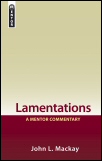
Lamentations
- Author: John L. MacKay
- Publisher: Mentor
- Publication Date: 2008
- Pages: 240
The five chapters of Lamentations may be easily overlooked. Not only is it brief, but it is also sandwiched between the two giants of Old Testament prophecy, Jeremiah and Ezekiel. Lamentations also deals with realities which we rather wish were not discussed—consequently the book is little studied. However, although there much here to challenge faith, there is much that builds it up. Lamentations was not written in the first instance to serve as warning to others, or to even keep alive the present memory of past suffering. It is the present that dominates the thought of the book. And in that present are overriding thoughts—“Has God left us?”; “Have we blown our chance as God’s covenant people?” “Is there a way forward towards the restoration?” John L. MacKay skillfully answers these questions and more.
John MacKay’s Lamentations is a good commentary for preaching. MacKay is aware of the issues but does not get bogged down in technicalities. Lamentations often is neglected, so this will be helpful.
—2009 Preaching Survey of Bibles and Bible References
John L. Mackay is internationally known as an Old Testament scholar and is also in demand for church retreats where his skill in the practical exposition and application of doctrine are well respected. He is also the author of Haggai, Zechariah, & Malachi and Jonah, Micah, Nahum, Habakkuk, & Zephaniah in the Focus on the Bible Commentary.
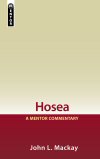
Like a wife unfaithful to her husband, so Israel was unfaithful to the Lord. This is vividly illustrated in the book of Hosea where Hosea’s own marriage represents Israel’s relationship with the Lord.
In worldly terms it appears that life is going well for God’s people. The Northern Kingdom had been going through a time of great economic stability and security. However this does not lead the people of Israel to give thanks to the Lord who is the provider of such blessings but rather they fall straight into the arms of the heathen idol Baal. Despite their unfaithfulness, the Lord does not give up on them, but rather he speaks to them in grace and mercy. Through the use of metaphors, Hosea brings an uncomfortable, yet vital message to warn them of impending judgment if they do not return to Yahweh, the one true God. Hosea shows that God’s constant love and perfect judgment, when put together, restores his relationship with his people. This prophecy is a book of hope for us today because it reminds us of God’s unfailing and faithful love for his people down through the ages even when they fail and fall so badly. Here is grace indeed!
John L. Mackay’s . . . commentary on Hosea is a rare thing: a commentary that is both scholarly and readable. The engagement with the text is thorough without ever getting over-complicated while the prose is consistently clear and vibrant. Even though all the questions you want addressed are addressed, you never feel like you are losing sight of the big picture. Hosea’s message of God’s deep love for his people and his covenantal commitment to them shine through. Meanwhile the regular reflection sections point in the direction of contemporary application. Preachers will find it a valuable guide to preaching Hosea.
—Tim Chester, pastor, The Crowded House, Sheffield
A divine tragedy played on a human stage, Hosea portrays the heart of God like no other Old Testament prophet and Mackay exposes it brilliantly. Whether unveiling the richness of the historical record, the prophet’s exalted Hebrew prose, or the anguish of a jilted lover, this commentary successfully maps the intersection of human faithlessness and God’s relentless grace. Connecting the text to its contemporary setting and highlighting its prophetic function within the story of God’s redemption of His people, within these pages one discovers a comprehensive treatment that every student who desires to understand Hosea and every preacher who aspires to explain it will be wise to consult.
—Hershael W. York, Victor and Louise Lester Professor of Preaching, The Southern Baptist Theological Seminary
This is a remarkable commentary on a remarkable book of the Bible. Hosea had a difficult message to bring to a faithless people, and God made the prophet’s own life a visual illustration of his message. In this commentary, full of characteristic attention to the original language, historical context, and theological themes of the Book of Hosea, Professor Mackay makes the prophet speak afresh to us. Of help to all serious readers of the Bible, this book brings out the timeless significance of the ancient prophet, and is a welcome addition to the literature on Hosea.
—Ian D. Campbell, minster, Point Free Church, Isle of Lewis
This commentary is vintage Mackay! It combines first rate scholarship with warm evangelical exposition. It is clear, concise, well researched, and written from a pastoral and practical perspective. Professor Mackay is no ivory tower academician; that much is sure. He is engaging and undeniably relevant, and he quite obviously loves the very scriptures that he seeks to expound. Every pastor and student of the Bible will want to get a copy of this valuable resource. No library should be without it.
—Guy M. Richard, minister, First Presbyterian Church, Gulfport, MS
John L. Mackay is internationally known as an Old Testament scholar and is also in demand for church retreats where his skill in the practical exposition and application of doctrine are well respected. He is also the author of Haggai, Zechariah, & Malachi and Jonah, Micah, Nahum, Habakkuk, & Zephaniah in the Focus on the Bible Commentary.
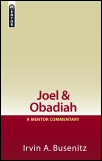
Joel & Obadiah
- Author: Irvin Busenitz
- Publisher: Mentor
- Publication Date: 2003
- Pages: 288
In this book you will discover the theme of Joel: the day of Yahweh. You will also discover more about the one to whom the day belongs to: Yahweh. The people were facing devastating calamity and Joel calls the society to repent in order that they might escape this judgment and once again enjoy mercy and favor of Yahweh. Obadiah also focuses on the dual aspects of the theme both that there is judgment and that blessing.
This is a fine commentary, exhibiting careful and balanced Old Testament scholarship expressed in attractive, vigorous prose. I did not find a sentence that was not clear: controversial issues affecting interpretation are well handled—for example the question as to whether the locusts in Joel 2 are literal or picture an invading army. The author argues well for an early date for Joel while recognizing the complexity of the issue and presenting contrary viewpoints clearly and fairly.
—Geoffrey Grogan, translator for the New King James Version
. . . It is colorful, brief, thought-provoking, and useful as an overview, or as a companion to a study in greater depth.
—Jeremy Walker, The Banner of Truth
Irvin Busenitz was a member of faculty at Talbot Theological Seminary before becoming a founding member of The Master’s Seminary where he has taught ever since. Dr. Busenitz was presented the John Solomon Award for excellence in Semitics and Old Testament, has done post-doctoral study at the American Institute of Holy Land Studies, has published journal and periodical articles, and is active in his local church and in Biblical conference ministries.
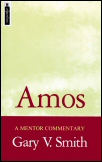
Amos
- Author: Gary Smith
- Publisher: Mentor
- Publication Date: 1998
- Pages: 400
The book of Amos is full of wordplays, double entendres, pictorial visions, and direct statements of fact and judgment. Smith’s job is to address the historical, stylistic and interpretative aspects of Amos: not just what is written, but also how and why the prophecies are recorded. To do this, Smith divides each of his chapters as follows:
- Important textual and philological questions
- Background study on the literary traditions and forms of speech employed
- Rhetorical markers of structure that unite paragraphs or larger units
- Exegetical issues of interpretation
- Main theological themes within each unit
Smith deals especially well with the last of these. Each chapter ends with him drawing together the interpretative threads arising from the passage.
This is a readable yet insightful volume, full of sound scholarship and clear writing.
—Themelios
Smith has produced a magisterial treatment of the book of Amos.
—Tremper Longman III, Old Testament scholar and author of Daniel in the NIV Application Commentary
Smith has . . . dissected the prophet in such a way as to leave scarcely any concern and thought unattended. Even more remarkable, he has done so without being wasteful of words or being unduly repetitious. . . . It is hard improve on this book. Every pastor and informed layman should add it to his library of expository aids.
—Eugene H. Merrill, author of An Historical Survey of the Old Testament
This is a fine [commentary] which should provide a valuable resource for serious students of the Old Testament for many years. The author inter-relates with the extensive literature available on the Book of Amos and is clearly able to assess the strengths and weaknesses of all types of criticism. . . . His exegetical judgment is excellent and he avoids dogmatism where the evidence tends to be evenly balanced.
—Geoffrey Grogan, translator of Amos for the New King James Version
Gary V. Smith is Professor of Old Testament at Midwestern Baptist Seminary, Kansas City.
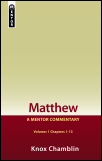
Matthew, vol. 1
- Author: Knox Chamblin
- Publisher: Mentor
- Publication Date: 2010
- Pages: 768
Matthew’s Gospel is the first document in the New Testament—a suitable location, considering some scholars’ opinions (for example, Theodor Zahn and Ernest Renan) that it is the preeminent piece of literature in antiquity. What sort of book is it? Who is its author, and why did he write it? What historical, literary, and theological contexts influence it? Matthew’s Gospel also tells a story of Jesus, the son of David the son of Abraham. Accordingly, it gives attention to characters, plot lines, conflicts and resolution, but also points its readers to the Savior of the world.
This thoughtful and thorough commentary on the First Gospel comes from a scholar who has obviously spent many years at the feet of Matthew the teacher, and even more importantly, at the feet of the one to whom Matthew bears witness.
—Jonathan T. Pennington, assistant professor of New Testament interpretation, The Southern Baptist Theological Seminary, Louisville, KY
My head hurts when I think of how Knox Chamblin weighed and worried over every Greek word or phrase in every sentence of Matthew’s Gospel and then has pulled it all together into a lucid and connected whole. And my heart is grateful for a commentary like this—that is thorough (he simply ‘milks’ the text), clear (both in its organization and in his positions), and ‘pushy’ (in driving us to worship). Chamblin clearly wants me to understand Matthew and to stand amazed in the presence of Jesus the Nazarene. Knox Chamblin is in vintage form here: relentlessly nailing us to the text and always wobbling on the edge of doxology.
—Dale Ralph Davis, pastor, Woodland Presbyterian Church, Hattiesburg, MS
Knox Chamblin was ordained to the gospel ministry in 1971. He did graduate work at Cambridge University, and received his ThD from Union Theological Seminary in Virginia in 1977. He taught for 34 years in Jackson, Mississippi, first at Belhaven College, then at Reformed Theological Seminary until retirement in 2001. He is author of Paul & the Self: Apostolic Teaching for Personal Wholeness.
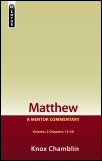
Matthew, vol. 2
- Author: Knox Chamblin
- Publisher: Mentor
- Publication Date: 2010
- Pages: 832
A continuation of Matthew vol. 1, this volume covers chapters 14–28. Knox Chamblin’s investigation of the text of this first New Testament Gospel is comprehensive, including extensive notes, outlines, and scriptural cross-references.
Knox Chamblin was ordained to the gospel ministry in 1971. He did graduate work at Cambridge University, and received his ThD from Union Theological Seminary in Virginia in 1977. He taught for 34 years in Jackson, Mississippi, first at Belhaven College, then at Reformed Theological Seminary until retirement in 2001. He is author of Paul & the Self: Apostolic Teaching for Personal Wholeness.
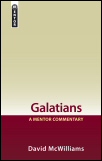
Galatians
- Author: David McWilliams
- Publisher: Mentor
- Publication Date: 2009
- Pages: 240
While David McWilliams’ exposition of Galatians keeps in mind the various mischaracterizations of Paul’s epistle that have become dominant, his purpose is not primarily polemical. The author sees Paul’s paramount concern to be acceptance with God through the work of Christ. McWilliams affirms: “everywhere in every way Paul’s concern is with the gospel; he is concerned with the personal salvation of sinners.” Written principally, though not exclusively as an aid to preachers, Galatians is an exposition that is scholarly yet readable, combining the rare qualities of depth and brevity.
David McWiliams has been the senior pastor at Covenant Presbyterian Church, Lakeland, Florida for 20 years. He has a passion for Christ-centered preaching and writing.

Philippians
- Author: Matthew S. Harmon
- Publisher: Mentor
- Publication Date: 2015
- Pages: 512
Christians throughout the centuries have loved Paul’s letter to the Philippians for its call to rejoice in the gospel of Jesus Christ regardless of life’s circumstances. But our familiarity with the letter can cause us to neglect or overlook Paul’s message to the Philippians. Matthew Harmon, in keeping with the aims of the Mentor Commentary series, provides an uplifting and inspiring commentary that brings context and application to this wonderful book, unfolding its rich theology and powerful teaching.
Matthew Harmon is professor of New Testament Studies at Grace Theological Seminary, Winona Lake, Indiana.